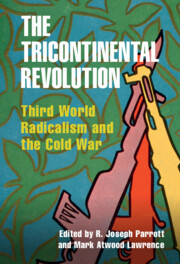Book contents
- The Tricontinental Revolution
- Cambridge Studies in US Foreign Relations
- The Tricontinental Revolution
- Copyright page
- Contents
- Figures
- Maps
- Contributors
- Notes
- Preface
- Abbreviations
- Introduction Tricontinentalism and the Anti-Imperial Project
- Part I Chronologies of Third Worldism
- Part II A Global Worldview
- Part III Superpower Responses to Tricontinentalism
- Part IV Frustrated Visions
- Afterword Patterns and Puzzles
- Select Bibliography of Secondary Sources
- Index
- References
Select Bibliography of Secondary Sources
Published online by Cambridge University Press: 06 January 2022
- The Tricontinental Revolution
- Cambridge Studies in US Foreign Relations
- The Tricontinental Revolution
- Copyright page
- Contents
- Figures
- Maps
- Contributors
- Notes
- Preface
- Abbreviations
- Introduction Tricontinentalism and the Anti-Imperial Project
- Part I Chronologies of Third Worldism
- Part II A Global Worldview
- Part III Superpower Responses to Tricontinentalism
- Part IV Frustrated Visions
- Afterword Patterns and Puzzles
- Select Bibliography of Secondary Sources
- Index
- References
Summary
- Type
- Chapter
- Information
- The Tricontinental RevolutionThird World Radicalism and the Cold War, pp. 347 - 352Publisher: Cambridge University PressPrint publication year: 2022
- Creative Commons
- This content is Open Access and distributed under the terms of the Creative Commons Attribution licence CC-BY-NC-ND 4.0 https://creativecommons.org/cclicenses/

